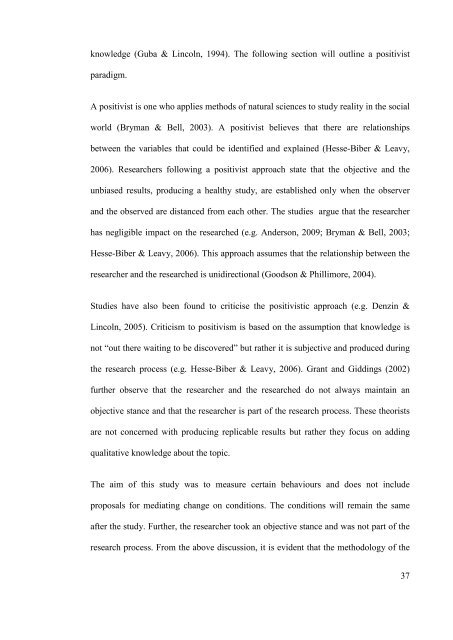View/Open
View/Open
View/Open
You also want an ePaper? Increase the reach of your titles
YUMPU automatically turns print PDFs into web optimized ePapers that Google loves.
knowledge (Guba & Lincoln, 1994). The following section will outline a positivist<br />
paradigm.<br />
A positivist is one who applies methods of natural sciences to study reality in the social<br />
world (Bryman & Bell, 2003). A positivist believes that there are relationships<br />
between the variables that could be identified and explained (Hesse-Biber & Leavy,<br />
2006). Researchers following a positivist approach state that the objective and the<br />
unbiased results, producing a healthy study, are established only when the observer<br />
and the observed are distanced from each other. The studies argue that the researcher<br />
has negligible impact on the researched (e.g. Anderson, 2009; Bryman & Bell, 2003;<br />
Hesse-Biber & Leavy, 2006). This approach assumes that the relationship between the<br />
researcher and the researched is unidirectional (Goodson & Phillimore, 2004).<br />
Studies have also been found to criticise the positivistic approach (e.g. Denzin &<br />
Lincoln, 2005). Criticism to positivism is based on the assumption that knowledge is<br />
not “out there waiting to be discovered” but rather it is subjective and produced during<br />
the research process (e.g. Hesse-Biber & Leavy, 2006). Grant and Giddings (2002)<br />
further observe that the researcher and the researched do not always maintain an<br />
objective stance and that the researcher is part of the research process. These theorists<br />
are not concerned with producing replicable results but rather they focus on adding<br />
qualitative knowledge about the topic.<br />
The aim of this study was to measure certain behaviours and does not include<br />
proposals for mediating change on conditions. The conditions will remain the same<br />
after the study. Further, the researcher took an objective stance and was not part of the<br />
research process. From the above discussion, it is evident that the methodology of the<br />
37

















